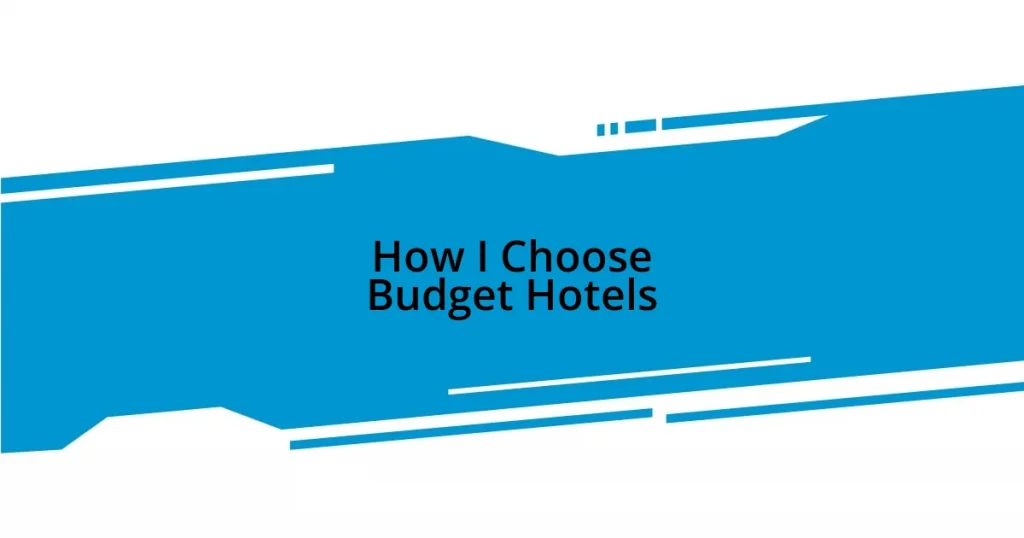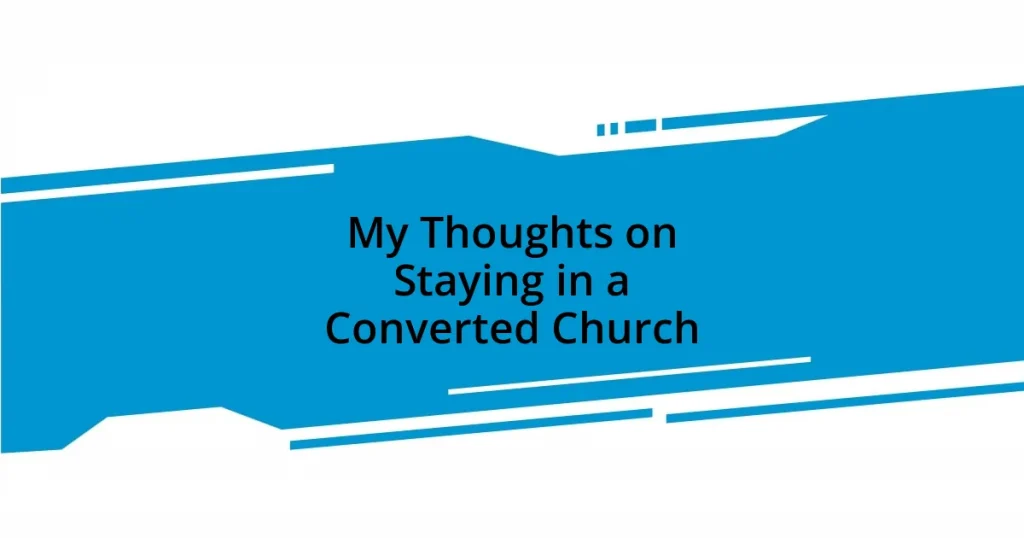Key takeaways:
- Budget hotels offer cultural experiences, allowing travelers to allocate more funds toward local activities and culinary adventures.
- Setting a realistic budget involves considering all potential expenses, including hidden costs like taxes and fees, to avoid overspending.
- Researching hotel locations is vital; factors like proximity to attractions, safety, and local amenities enhance the overall travel experience.
- Using price comparison tools can uncover better deals and unique perks available only through direct bookings with hotels.
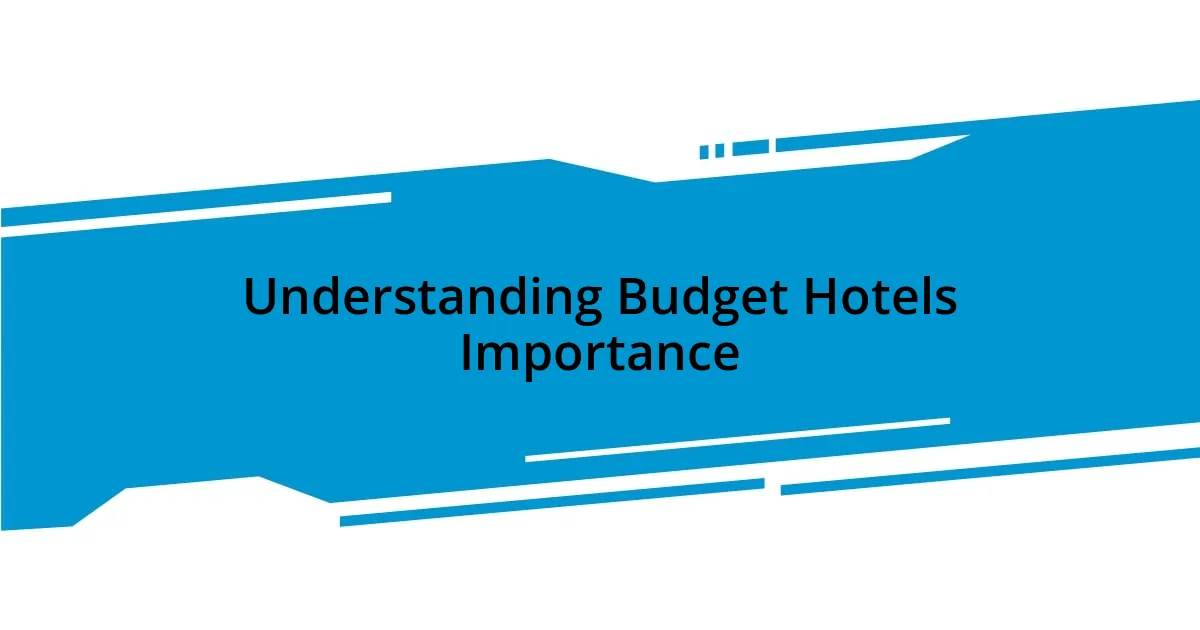
Understanding Budget Hotels Importance
When I think about budget hotels, I realize their significance goes far beyond just a low price tag. They often serve as gateways for travelers seeking to experience the local culture without overspending. I remember once staying in a modest hotel in a bustling city—it was there that I met people from all walks of life, sharing stories and advice that truly enriched my trip.
Budget hotels also provide a sense of accessibility for everyone, enabling travelers to explore places they might otherwise avoid due to high accommodation costs. Have you ever found yourself marveling at how much more you can experience when you’re not tied down by extravagant lodging? I certainly have. Choosing a budget hotel allows me to allocate more of my budget towards activities, local food, and experiences, ultimately making my travel much more fulfilling.
Moreover, the unexpected charm of budget hotels often surprises me. For instance, I once stayed at a small, family-run place where the owner went out of his way to make me feel at home, sharing his favorite local spots. These personal touches can make a vacation unforgettable and remind us that great experiences don’t always come with a high price. Why not embrace the unique opportunities that budget hotels offer?
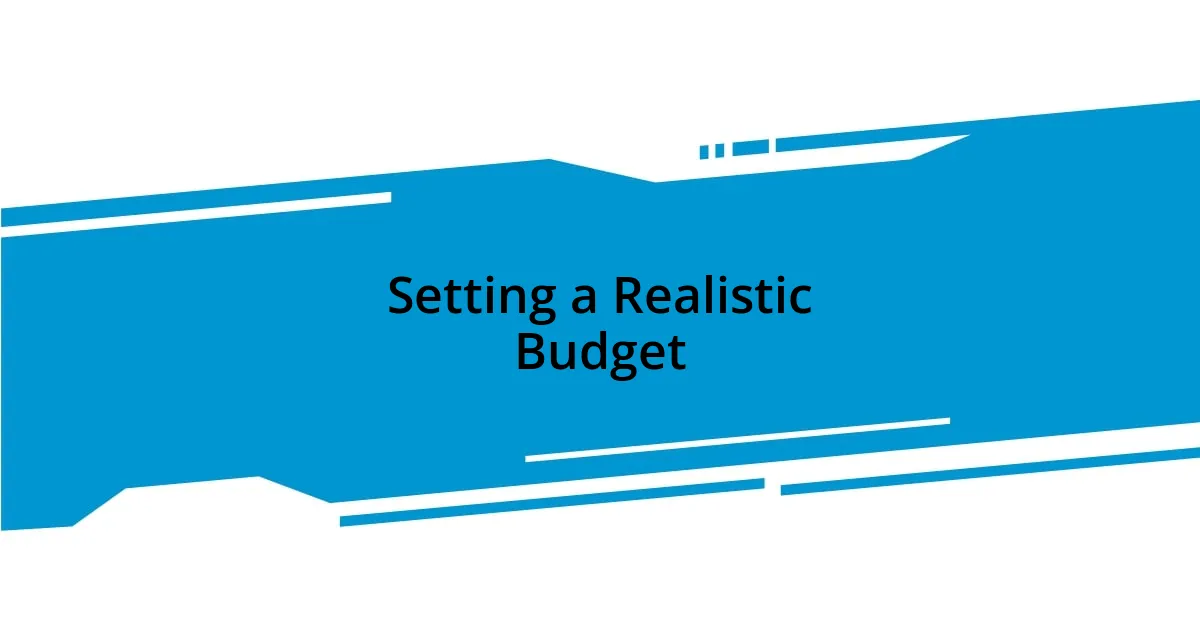
Setting a Realistic Budget
Setting a realistic budget is crucial when choosing budget hotels. I always start by looking at my overall travel expenses and figuring out how much I’m willing to spend on accommodations. For instance, on a recent trip, I allocated 30% of my total budget to lodging, which helped me focus on finding the right options within that limit.
When planning my budget, I also consider additional costs like taxes, fees, and amenities. These hidden expenses can sneak up on you! A while ago, I found a hotel that seemed perfect at first glance, but then I realized the parking fees and daily resort charges pushed the total well above my initial budget. This experience taught me the importance of breaking down all associated costs so I can truly see where my money goes.
I’ve learned that setting a realistic budget involves prioritizing what matters most for my trip. Do I need a central location for easy access to attractions, or is a peaceful retreat more essential? By assessing my priorities, I can make informed choices without feeling pressured to compromise too much. After all, a budget hotel stay should enhance the experience, not limit it.
| Expense Type | Example Cost |
|---|---|
| Hotel Rate | $75 per night |
| Taxes & Fees | $15 |
| Amenities (Wi-Fi, Breakfast) | $10 |

Researching Hotel Locations Effectively
Researching hotel locations effectively is one of the most critical stages in my travel planning. I typically dive into Google Maps to analyze the area surrounding potential hotels, looking for key attractions, public transport options, and local dining spots. There’s nothing quite like stumbling upon a charming cafe just a few steps from where I’m staying; it often becomes a favorite haunt during my travels. I remember finding a little eatery close to my budget hotel in Paris that served the best pastries I’ve ever tasted—something I’d have missed if I hadn’t done my homework.
To ensure I make the most out of my hotel location research, I focus on the following factors:
- Proximity to Attractions: How close is the hotel to the sites I want to visit?
- Transportation Options: Are there reliable public transport links nearby?
- Neighborhood Safety: Is the area well-reviewed in terms of safety at night?
- Local Amenities: Are there grocery stores, pharmacies, and restaurants within walking distance?
- Vibe of the Area: Does the neighborhood feel welcoming or lively?
By prioritizing these elements, I can find a budget hotel that enhances my travel experience rather than detracts from it. Knowing where to stay shapes how I feel about a trip, and a well-researched location can transform an ordinary getaway into a wonderful adventure.

Evaluating Hotel Amenities and Services
When evaluating hotel amenities and services, I always ask myself, “What truly enhances my stay?” It’s easy to overlook the small details, but I find that amenities like complimentary breakfast or free Wi-Fi can make a significant difference, especially during long trips. For instance, on one occasion, I stayed at a budget hotel that included breakfast. Not only did it save me money, but it also provided a great start to my day with fresh coffee and pastries, a real bonus I deeply appreciated.
I focus on essential services that align with my travel needs. Is there a 24-hour front desk? That little detail can be a lifesaver if my flight gets in late. Moreover, when I recently explored a hotel with laundry facilities, I realized it allowed me to pack lighter and avoid hefty baggage fees. Who wouldn’t want to travel without the worry of lugging around a suitcase full of dirty clothes? It’s these amenities that seem minor at first but can genuinely elevate a budget hotel experience.
I also look beyond the basics to see if there are unique offerings that add value. For example, some hotels have partnerships with local attractions, providing discounts or free admission. During a trip to a vibrant city, I discovered a hotel offering free bike rentals, which encouraged me to explore like a local. Riding through the streets, with the wind in my hair, made my journey memorable. Evaluating amenities isn’t just about comfort; it’s about finding those unique touches that can transform an ordinary stay into an unforgettable adventure.
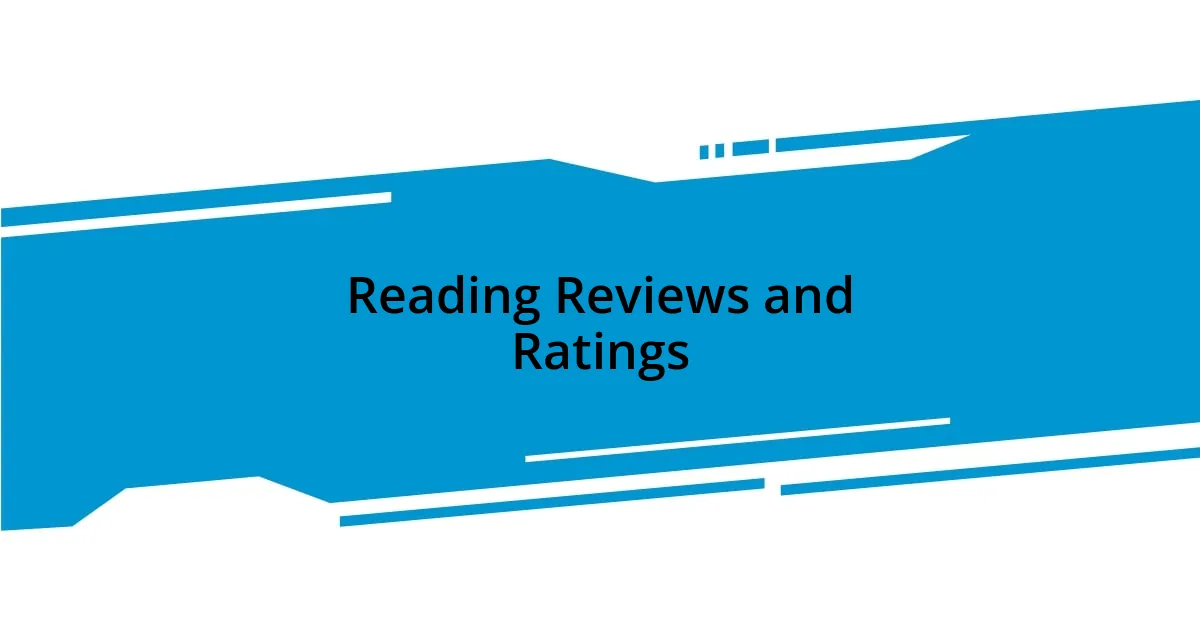
Reading Reviews and Ratings
Reading reviews and ratings is a crucial part of my hotel selection process. Whenever I come across a potential budget hotel, I always comb through the reviews on sites like TripAdvisor and Booking.com. I remember once leaning towards a hotel that had stunning pictures, but a couple of negative reviews about hygiene made me rethink. Especially when it comes to affordable options, I find that reading about other people’s experiences helps me gauge what I might expect during my stay.
For me, the star ratings provide a quick overview, but it’s the written reviews that tell the real story. I look for patterns in the feedback – do multiple guests mention a friendly staff or great location? A few years ago, I booked a budget hotel with rave reviews about its welcoming atmosphere. When I arrived, the staff truly made me feel at home, and I realized that those reviews weren’t just fluff; they reflected a genuine culture of hospitality. Isn’t it incredible how one aspect can shape your entire stay?
I also trust my instincts when it comes to the reviews; some comments simply resonate with me. For instance, if someone raves about how comfortable the beds were, I can’t help but feel a bit giddy imagining myself sinking into plush sheets after a long day of exploring. It’s these little details that transform a budget hotel from merely a place to sleep into an experience worth cherishing. What’s your favorite anecdote from a hotel stay? I’m always eager to hear those personal stories that add a touch of warmth to travel planning.
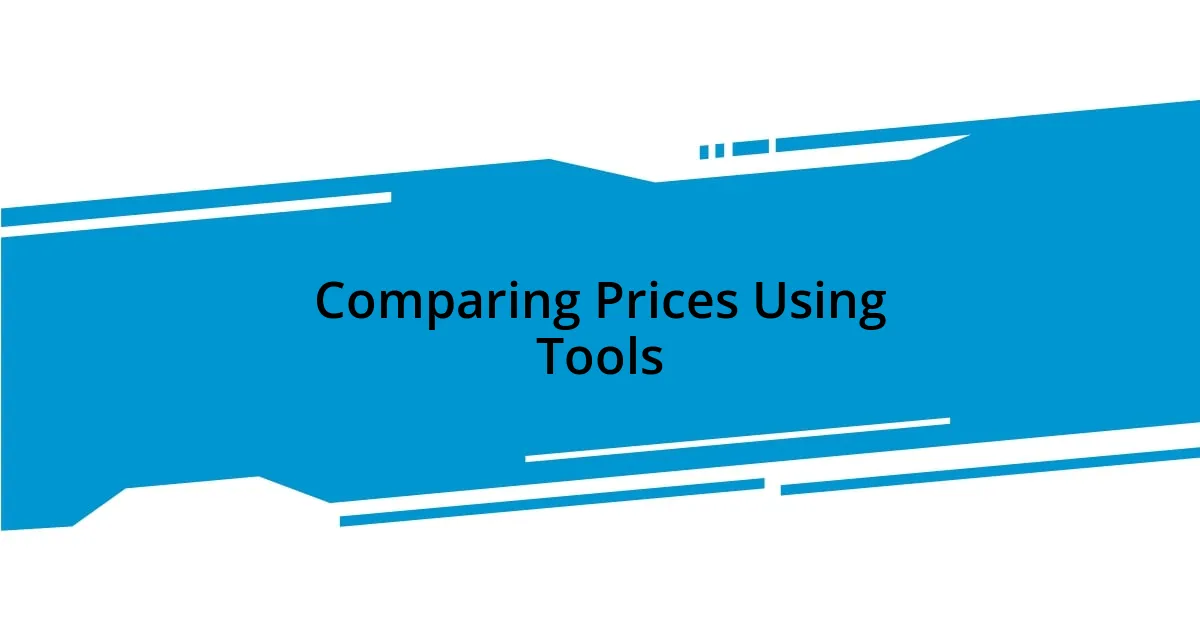
Comparing Prices Using Tools
When comparing prices using tools, I find myself gravitating towards aggregator websites like Kayak and Trivago. These platforms allow me to scan multiple hotels at once, which not only saves time but helps me feel confident about the decisions I make. I still remember booking a stay in a bustling city where these tools showed me a lesser-known hotel that was significantly cheaper than the popular chains. Who would have thought that a hidden gem could offer such great value?
While these tools are fantastic for finding rates, I also delve into individual hotel websites for exclusive deals. Many times, I’ve stumbled upon promotions available only when booking directly, like a complimentary night if I stay three days. For example, last summer, I booked a hotel known for its eco-friendly practices. I was thrilled to find out that they offered a free room upgrade to guests who booked directly through their website. Suddenly, an already budget-friendly option became a remarkable deal, all thanks to a simple price comparison.
I’ve learned that it’s not just about finding the lowest rate; it’s about what value I get for the price. Sometimes, a slightly higher rate might include added benefits like free parking or breakfast. I remember booking a hotel for a weekend getaway where the price was a bit steeper, but it included a spa credit. That little bonus turned into a much-needed relaxation session that transformed my entire trip. Don’t you think it’s those thoughtful details that can turn a good deal into an unforgettable experience?
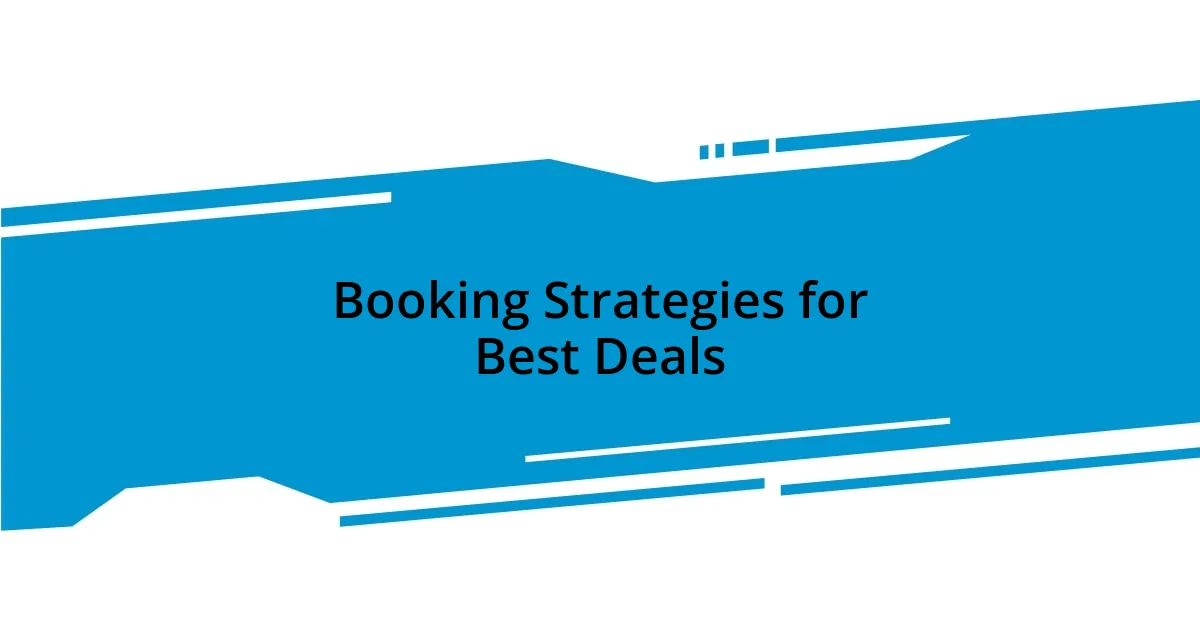
Booking Strategies for Best Deals
When it comes to timing my bookings, I’ve discovered that flexibility can lead to incredible savings. I often keep an eye on trends in hotel pricing over time, and I’ve noticed that mid-week stays tend to be less expensive than weekends. Last year, I planned a little getaway and took the plunge by booking on a Tuesday—a day that many travelers overlook. Not only did I secure a room at a fraction of the weekend rate, but the hotel was also pleasantly less crowded. Have you ever tried booking during off-peak times? It can feel like a treasure hunt!
Another strategy I love is using loyalty programs. Even as a budget-conscious traveler, I’ve signed up for hotel chains’ loyalty programs, and the perks have been fantastic. I remember my surprise when I booked a budget hotel and received points that accumulated towards a free night after just a few stays. It felt like an unexpected bonus—like finding money in an old coat pocket. Are you tapping into any reward systems that enhance your travel experience?
Staying persistent with my research has paid off, too. I often set alerts on various travel websites for my desired hotels. There was one instance where a property I had my eye on dropped its rate significantly just days after I started watching. I jumped at the chance and snagged a great deal! This little trick has become my go-to strategy for getting the best bang for my bucks. It’s amazing how a little patience can lead to surprising results; have you experienced something similar when hunting for deals?











